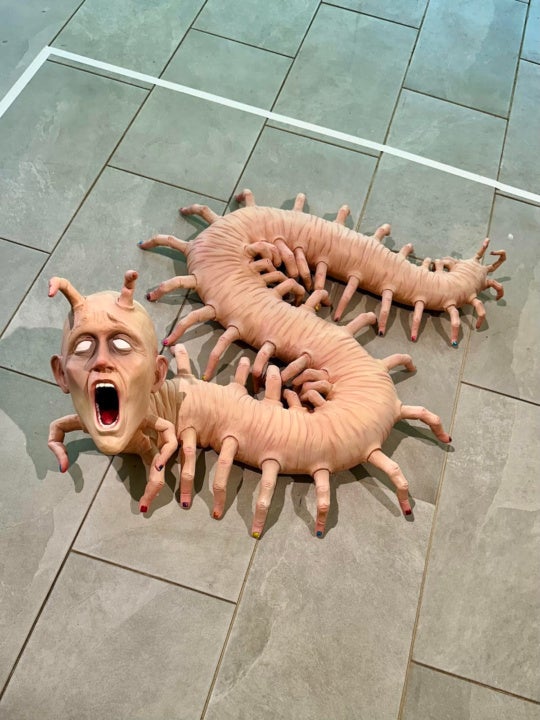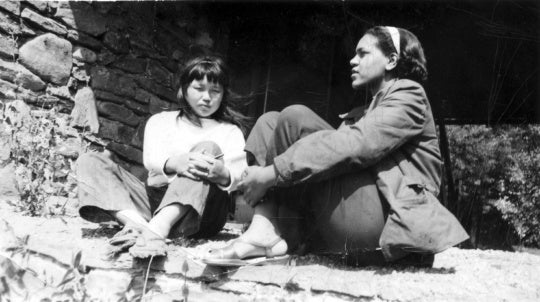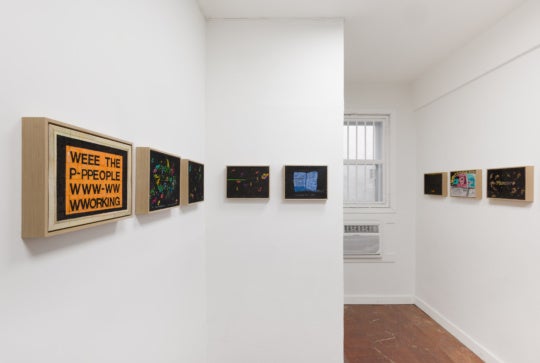
Note: As of 10AM Monday, three of the five remaining nights were all sold out, leaving Wednesday and Saturday as the only options left. Click here for more ticket information.
Why doesn’t Little Red Riding Hood wear white? For centuries the storybook girl who encounters a wolf on the way to Grandma’s house has been a symbol of innocence at risk. Her signature garment, however, glows with the hues of high passions rather than virginal purity. The redness signals that the story involves a girl on the cusp of womanhood and her introductions to some adult realities.
Recently-formed theatrical company Saïah subjects the Little Red Riding Hood story to a battery of psychological interpretations with Rua | Wülf, a wildly imaginative performance that encompasses seemingly every corner of the rustic 12-acre Goat Farm Arts Center. Directed by Marium Khalid (click here for BURNAWAY’s interview), Rua | Wülf takes adventurous audiences on a one-of-a-kind experience, although people who try to sort out its themes might end up feeling lost.
The audience—no more than 50 per night—gathers at dusk around the Seed House, a small building furnished like a cottage. Young Rua (A.C. Smallwood) and her overprotective mother (Caitlin Reeves) do chores, make small talk, and ignore the spectators until the audience is ushered inside the building. In barges the guide (Claire Rigby), a spirited, confrontational narrator who suggests a foul-mouthed, college-educated version of Puck at a Shakespeare in the Park production of A Midsummer Night’s Dream. The Guide’s commentaries both articulate the fairy tale’s psychological interpretations and take the piss out of them. At one moment she’ll analyze the characters’ “risk-taking aggressive narcissistic behavior,” then she’ll make raunchy jokes and references to fading celebrities like Tara Reid.

Rua convinces her parent that she’s old enough to take provisions to Grandma’s house. The mother informs her that “We must let our responsibilities define us, not our desires,” and we soon discover that Grandma embodies the opposite philosophy. Which path will Rua choose when tempted by Hemming (Tim Batten), an older man from the community who initially appears in suit, tie, and glasses? Compared to the story’s usual male predators, Hemming has complicated a backstory involving prior relationships to Rua’s family. He may not even be the wolf, as Rua speculates that he could be the Huntsman, the law-enforcing dreamboat who may or may not really exist.
Rua and Hemming’s flirtation heats up under the stars and amid flowers, and then the Guide shares a story that flips the script. An ancient tale of a boy seduced by a she-wolf reverses the traditional gender roles of Little Red Riding Hood, and spurs the audience to wonder who’s the real corrupter, and who’s being led astray?
Frankly, the character’s speeches and interactions tend to be long-winded, drawing out more than needed to make their points, especially based on such a familiar story. What Rua | Wülf says turns out to have less impact than where it says it. The journey through the Goat Farm’s locales makes a fascinating aesthetic journey, almost like a tour of Jungian archetypes. On arrival, the spectators pass farm buildings, including a small herd of goats, and the various installations feature open-air gardens and swings dangling from branches. Intermission features an al fresco tea party, complete with home-made cookies, as if we’ve taken a shortcut through Alice in Wonderland.
Much of the story winds the audience through the shadowy, dilapidated industrial buildings. The cluttered, dimly-illuminated structures at times don’t even have roofs, and evoke the kinds of locales where detectives catch serial killers at the end of movie thrillers. The evening can feature a soundtrack of noise from passing trains, helicopters, and even a large turkey who punctuates a speech with its gobbles. It’s like a fascinating, immersive art exhibit that no two people will interpret in quite the same way.

The Guide takes her own journey as the story breaks from tradition and her confidence grows increasingly shaken. At one point she says to herself, “I warned him, but he wouldn’t listen,” referring to Hemming when he deviates from the fairy tale’s conventional plot.
When we finally arrive at Grandma’s house, the faded matriarch (Mary Wolfson) lounges atop a van-sized bed beneath a decaying chandelier. It’s like a Tennessee Williams fever dream. But from here, the attempt to wed fairytale plot points to explicit sexuality sends the narrative off the rails. Instead of exploring a set of archetypal dynamics between man and woman, the story turns so weirdly specific and kinky that it loses much of its thematic resonance.
Saïah’s Rua | Wülf unexpected addition culminates a season-long exploration of Red Riding Hood that spans Atlanta theater. The Alliance began the season with Stephen Sondheim’s intricate fairytale deconstruction Into the Woods, and later viewed folktales through a prism of contemporary Moscow with The Fairytale Lives of Russian Girls. Synchronicity Theatre even offered a Cajun-flavored, family-oriented version of the story Petite Rouge. (Editor’s note: Curt Holman reviewed all three plays for Creative Loafing, so we’ve directed the links there, for your convenience.)
Rua | Wülf reinforces a theme implicit in all of them—that people might be safer on the straight and narrow path, but they’ll only learn the important lessons when they venture away from it. While Rua | Wülf sends its heroine into an emotional wilderness, it resembles the places where we work and play. A wolf may find you when you least expect it.
Rua | Wülf Through Sunday, April 29, 2012. Performances begin at sundown. $25-$30; performances limited to 50 people. The Goat Farm, 1200 Foster Street.




